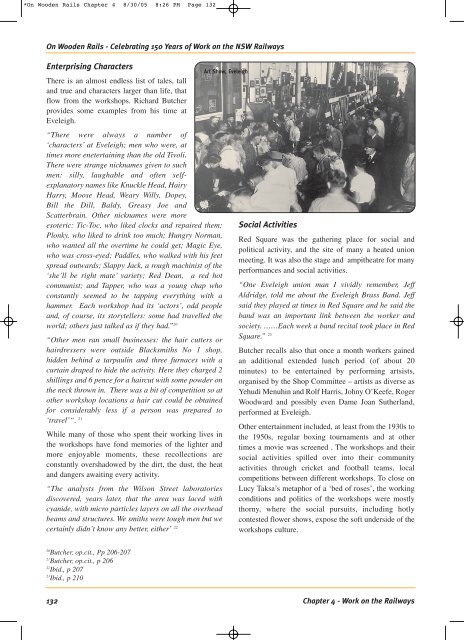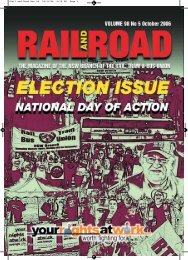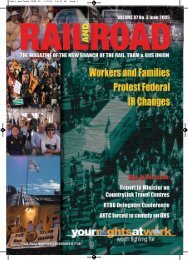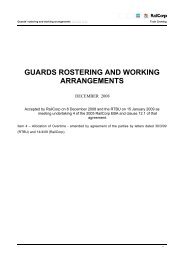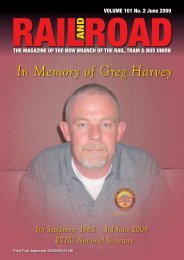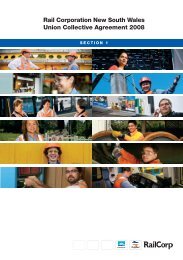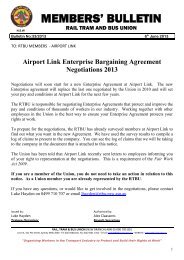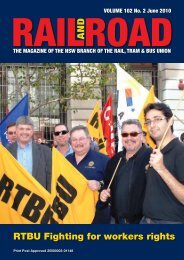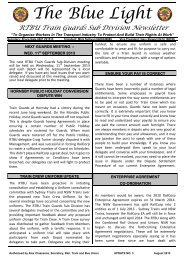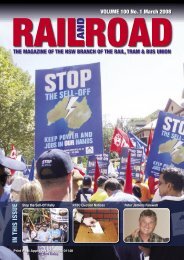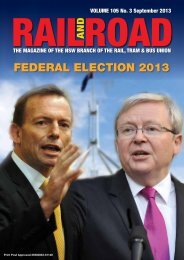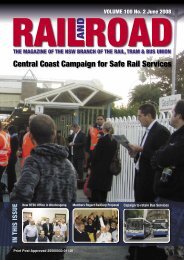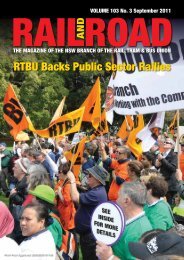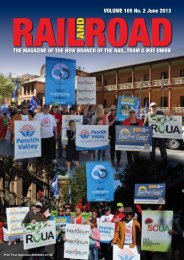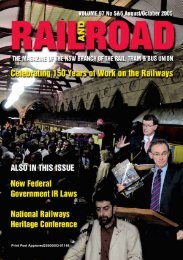Chapter 4 - Work on the Railways - Rail, Tram and Bus Union of NSW
Chapter 4 - Work on the Railways - Rail, Tram and Bus Union of NSW
Chapter 4 - Work on the Railways - Rail, Tram and Bus Union of NSW
Create successful ePaper yourself
Turn your PDF publications into a flip-book with our unique Google optimized e-Paper software.
*On Wooden <strong>Rail</strong>s <str<strong>on</strong>g>Chapter</str<strong>on</strong>g> 4 8/30/05 8:26 PM Page 132<br />
On Wooden <strong>Rail</strong>s - Celebrating 150 Years <strong>of</strong> <str<strong>on</strong>g>Work</str<strong>on</strong>g> <strong>on</strong> <strong>the</strong> <strong>NSW</strong> <strong><strong>Rail</strong>ways</strong><br />
Enterprising Characters<br />
There is an almost endless list <strong>of</strong> tales, tall<br />
<strong>and</strong> true <strong>and</strong> characters larger than life, that<br />
flow from <strong>the</strong> workshops. Richard Butcher<br />
provides some examples from his time at<br />
Eveleigh.<br />
“There were always a number <strong>of</strong><br />
‘characters’ at Eveleigh; men who were, at<br />
times more enetertaining than <strong>the</strong> old Tivoli.<br />
There were strange nicknames given to such<br />
men: silly, laughable <strong>and</strong> <strong>of</strong>ten selfexplanatory<br />
names like Knuckle Head, Hairy<br />
Harry, Moose Head, Weary Willy, Dopey,<br />
Bill <strong>the</strong> Dill, Baldy, Greasy Joe <strong>and</strong><br />
Scatterbrain. O<strong>the</strong>r nicknames were more<br />
esoteric: Tic-Toc, who liked clocks <strong>and</strong> repaired <strong>the</strong>m;<br />
Pl<strong>on</strong>ky, who liked to drink too much; Hungry Norman,<br />
who wanted all <strong>the</strong> overtime he could get; Magic Eye,<br />
who was cross-eyed; Paddles, who walked with his feet<br />
spread outwards; Slappy Jack, a rough machinist <strong>of</strong> <strong>the</strong><br />
‘she’ll be right mate’ variety; Red Dean, a red hot<br />
communist; <strong>and</strong> Tapper, who was a young chap who<br />
c<strong>on</strong>stantly seemed to be tapping everything with a<br />
hammer. Each workshop had its ‘actors’, odd people<br />
<strong>and</strong>, <strong>of</strong> course, its storytellers: some had travelled <strong>the</strong><br />
world; o<strong>the</strong>rs just talked as if <strong>the</strong>y had.” 20<br />
“O<strong>the</strong>r men ran small businesses: <strong>the</strong> hair cutters or<br />
hairdressers were outside Blacksmiths No 1 shop,<br />
hidden behind a tarpaulin <strong>and</strong> three furnaces with a<br />
curtain draped to hide <strong>the</strong> activity. Here <strong>the</strong>y charged 2<br />
shillings <strong>and</strong> 6 pence for a haircut with some powder <strong>on</strong><br />
<strong>the</strong> neck thrown in. There was a bit <strong>of</strong> competiti<strong>on</strong> so at<br />
o<strong>the</strong>r workshop locati<strong>on</strong>s a hair cut could be obtained<br />
for c<strong>on</strong>siderably less if a pers<strong>on</strong> was prepared to<br />
‘travel’“. 21<br />
While many <strong>of</strong> those who spent <strong>the</strong>ir working lives in<br />
<strong>the</strong> workshops have f<strong>on</strong>d memories <strong>of</strong> <strong>the</strong> lighter <strong>and</strong><br />
more enjoyable moments, <strong>the</strong>se recollecti<strong>on</strong>s are<br />
c<strong>on</strong>stantly overshadowed by <strong>the</strong> dirt, <strong>the</strong> dust, <strong>the</strong> heat<br />
<strong>and</strong> dangers awaiting every activity.<br />
“The analysts from <strong>the</strong> Wils<strong>on</strong> Street laboratories<br />
discovered, years later, that <strong>the</strong> area was laced with<br />
cyanide, with micro particles layers <strong>on</strong> all <strong>the</strong> overhead<br />
beams <strong>and</strong> structures. We smiths were tough men but we<br />
certainly didn’t know any better, ei<strong>the</strong>r’ 22<br />
20 Butcher, op.cit., Pp 206-207<br />
21 Butcher, op.cit., p 206<br />
22 Ibid., p 207<br />
23 Ibid., p 210<br />
132<br />
Art Show, Eveleigh<br />
Social Activities<br />
Red Square was <strong>the</strong> ga<strong>the</strong>ring place for social <strong>and</strong><br />
political activity, <strong>and</strong> <strong>the</strong> site <strong>of</strong> many a heated uni<strong>on</strong><br />
meeting. It was also <strong>the</strong> stage <strong>and</strong> ampi<strong>the</strong>atre for many<br />
performances <strong>and</strong> social activities.<br />
“One Eveleigh uni<strong>on</strong> man I vividly remember, Jeff<br />
Aldridge, told me about <strong>the</strong> Eveleigh Brass B<strong>and</strong>. Jeff<br />
said <strong>the</strong>y played at times in Red Square <strong>and</strong> he said <strong>the</strong><br />
b<strong>and</strong> was an important link between <strong>the</strong> worker <strong>and</strong><br />
society. ……Each week a b<strong>and</strong> recital took place in Red<br />
Square.” 23<br />
Butcher recalls also that <strong>on</strong>ce a m<strong>on</strong>th workers gained<br />
an additi<strong>on</strong>al extended lunch period (<strong>of</strong> about 20<br />
minutes) to be entertained by performing artsists,<br />
organised by <strong>the</strong> Shop Committee – artists as diverse as<br />
Yehudi Menuhin <strong>and</strong> Rolf Harris, Johny O’Keefe, Roger<br />
Woodward <strong>and</strong> possibly even Dame Joan Su<strong>the</strong>rl<strong>and</strong>,<br />
performed at Eveleigh.<br />
O<strong>the</strong>r entertainment included, at least from <strong>the</strong> 1930s to<br />
<strong>the</strong> 1950s, regular boxing tournaments <strong>and</strong> at o<strong>the</strong>r<br />
times a movie was screened . The workshops <strong>and</strong> <strong>the</strong>ir<br />
social activities spilled over into <strong>the</strong>ir community<br />
activities through cricket <strong>and</strong> football teams, local<br />
competiti<strong>on</strong>s between different workshops. To close <strong>on</strong><br />
Lucy Taksa’s metaphor <strong>of</strong> a ‘bed <strong>of</strong> roses’, <strong>the</strong> working<br />
c<strong>on</strong>diti<strong>on</strong>s <strong>and</strong> politics <strong>of</strong> <strong>the</strong> workshops were mostly<br />
thorny, where <strong>the</strong> social pursuits, including hotly<br />
c<strong>on</strong>tested flower shows, expose <strong>the</strong> s<strong>of</strong>t underside <strong>of</strong> <strong>the</strong><br />
workshops culture.<br />
<str<strong>on</strong>g>Chapter</str<strong>on</strong>g> 4 - <str<strong>on</strong>g>Work</str<strong>on</strong>g> <strong>on</strong> <strong>the</strong> <strong><strong>Rail</strong>ways</strong>


